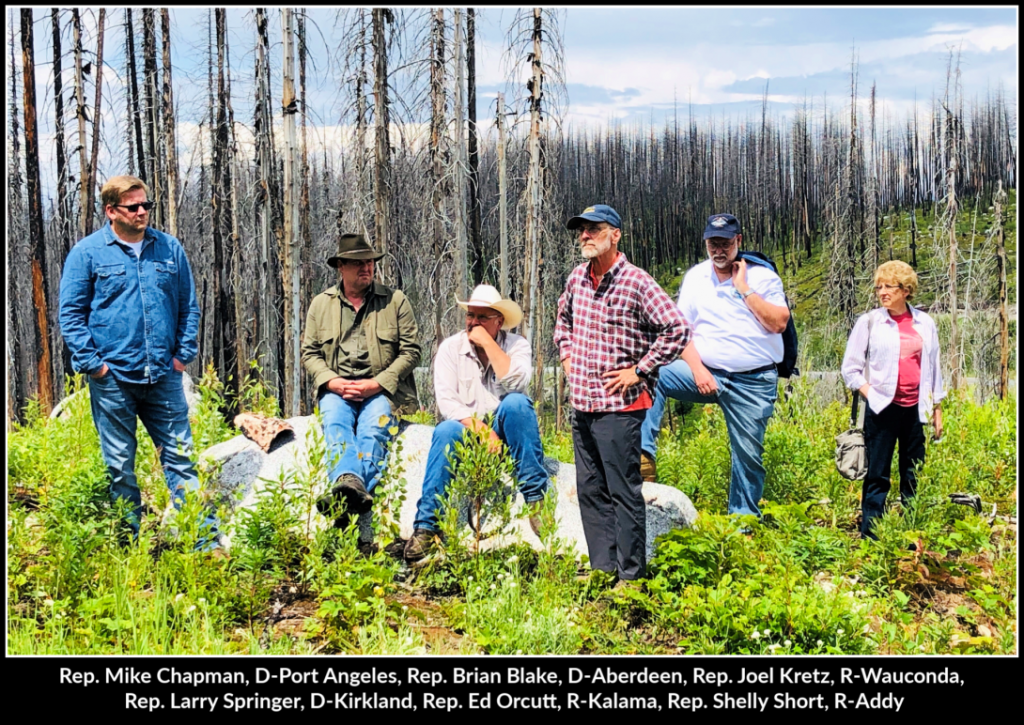OLYMPIA—In the past decade, perhaps no two issues have affected local communities, ranchers and families in Northeast Washington more than wolves and wildfires.
Last week, a bipartisan group of lawmakers joined with legislative staffers, agency officials, local ranchers and federal foresters to discuss the problems, frustrations and potential solutions to these two critical issues.

Members of the House Rural Development, Agriculture and Natural Resources Committee began their day at the Sherman Creek Wildlife Area Headquarters. They were welcomed by local legislators, Rep. Joel Kretz, R-Wauconda and Sen. Shelly Short, R-Addy, as well as Kelly Susewind, Director of the Washington Department of Fish and Wildlife (WDFW). They then listened to WDFW officials describe their animal capture plans, techniques, and equipment.
Later, the legislators drove through scarred and burnt federal forestland on their way to the Deer Creek Summit Campground at the top of Boulder. There, the lawmakers heard from Republic District Ranger Travis Fletcher. The group saw the damage done to the forest and then discussed the forest management techniques now being utilized on state land to help prevent massive wildfires.
The tour ended with a stop at a local ranch near Danville to hear from fifth-generation cattle producers about the struggles they are having with wolves.
The ranchers described how the threat of wolves continues to force cattle off the higher elevation grazing areas, leading to an overabundance of dry grasses, which serves as potential fuel for wildfires. This also places more stress on lowland grazing areas needed for later in the year as well as using up water at lower elevations.
The cattlemen also described their encounters with wolves, their interactions with WDFW officials when going through the “confirmed wolf kill” process, as well as the effects the wolves have on the pregnancy rates and weights of their cows.
“As a state, we’ve got to do better by these communities,” said Rep. Brian Blake, D-Aberdeen and chair of the committee. “We need to be thinking out-of-the box in order to keep our producers whole and ensure these multigenerational ranchers have a chance at staying in business.”
Blake’s committee was invited to tour the region and interact with local community members by Kretz, an outspoken critic of recent forest and wolf management practices.
“It seems we are making some headway with our forest management so that we might have a fighting chance when the next major wildfire strikes our region,” said Kretz. “But we’re not seeing a lot of progress on the wolf side of things. My four northern counties have enough wolves to delist in the entire state, but because of political boundaries, it’s not been possible. My district continues to be held hostage by statewide wolf repopulation expectations. There are folks here that are barely hanging on. They can’t wait another three or four years for a solution. They needed one yesterday. I’m glad some of our Westside lawmakers traveled across the state to see firsthand the problems we face.”
Rep. Debra Lekanoff, D-Bow, said that some of her fondest childhood memories include time spent in Northeast Washington and that committee members acknowledge the urgency of the situation.
“Is there another way, by using increased management methods in the wolf management plan, to address the problems ranchers and cattlemen are facing?” asked Lekanoff. “What can the Legislature do to better manage the resources or provide the policy, laws, regulations, science, data and funding to help this rural community sustain its way of life with the predators, prey and livestock that all call this place home? We take our commitment of continued economic viability to this rural community seriously and commit to address these issues with urgency. We are not turning our backs on rural Washington.”
The visit to Northeast Washington by members of the House Rural Development, Agriculture and Natural Resources Committee was the first to the region in nearly a decade.
“This is a committee that deals with rural issues. It’s vitally important that committee members get out of Olympia whenever possible in order to see the real-world problems our folks in rural Washington are up against,” said Kretz. “I’m very grateful for the legislators who made the trip up here. I’m hopeful that come next legislative session, we can work in a bipartisan fashion to provide relief to my communities.”
###
